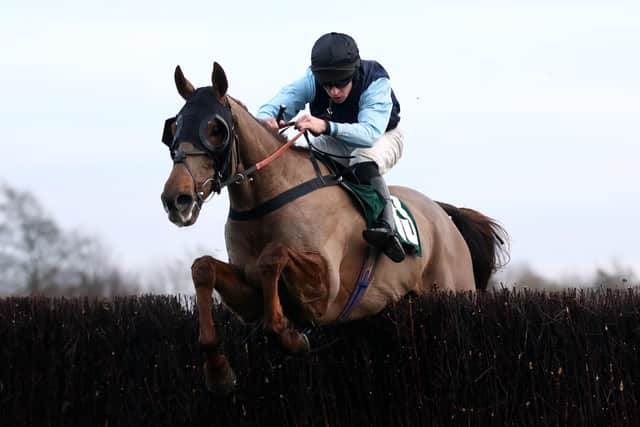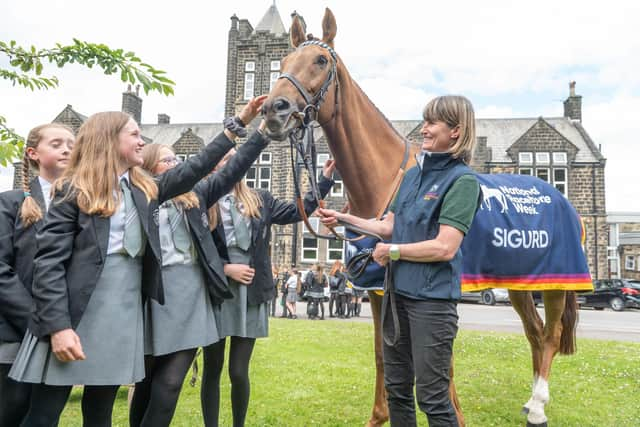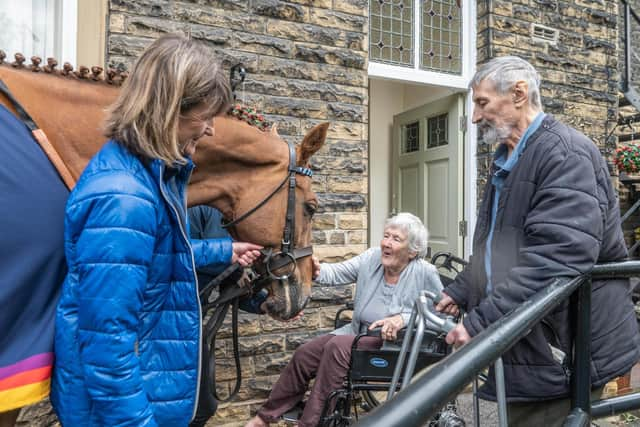Go behind the scenes of a racehorse life in Yorkshire as thoroughbreds are also hailed for healing humans
As part of National Racehorse Week, 16,000 members of the public will get to meet a racehorse for free.
Great British Racing, organisers of the weeklong event that is in its third year, hope to engage with at least an additional 3,000 people through 60 community events which will take place away from race-yards and stables.
Advertisement
Hide AdAdvertisement
Hide AdMany former and current racehorses will visit schools, care homes, hospitals and mental health charities during the week, giving those, particularly in city locations or unable to get to a yard, the chance to get up close with a horse, sometimes for the very first time.


The 60 events will include 24 school visits; 20 charity visits including Mind, tickets4troops, Autism in Racing, Riding for Disabled Association and other community groups; eight care home visits; four hospital visits; four urban equestrian centres.
National Racehorse Week was born out of an idea in 2019 by trainer, Richard Phillips, who wanted to create a single event that the entire country could get behind to celebrate the animals who power racing and provide entertainment for millions, whilst also providing the public and policymakers with insight into the care they receive behind the scenes.
The event also now coincides with a growing movement to deliver equine services due to the healing and therapeutic effect that horses can have on humans.
Advertisement
Hide AdAdvertisement
Hide AdRacehorse trainer and Yorkshire Post columnist, Jo Foster will be taking part in community events and is based at Ilkley but regularly works with communities in Bradford where active racer, Sigurd, visits schools and care homes in between competing.


Last year, Mrs Foster and Sigurd won Good Morning Britian’s One Million Minute Award for their service in the community.
Mrs Foster said: “Sigurd is an incredible horse - he competes on the racecourse, but also regularly visits schools and residential homes, which has become second nature to him. I’ve never known a horse so able to relax and genuinely relate to people, from children with special needs, to older people in wheelchairs.”
“For me, National Racehorse Week is about how we, as trainers, can help people and give back to the community. These wonderful horses offer us so much more than winning races: they put smiles on people’s faces and can genuinely help people who are feeling sad, lonely, or isolated. It’s also an opportunity for people to come and see how we, in turn, look after our racehorses.”
Advertisement
Hide AdAdvertisement
Hide AdNational Racehorse Week, September 9 to 17, will be bookended by open days taking place at Malton on 10th September and The Henry Cecil Open Weekend in Newmarket, bringing the total number of locations on offer to the public during that period to more than 160. These events are not free to attend, but tickets funds are donated to Racing Welfare, British Racing School and Newmarket Open Door.


At Malton on September 10, Racing Welfare has linked with York Racecourse to allow Malton Open Day attendees to see behind the scenes of a training yard before heading to York Racecourse in the afternoon to enjoy the YorkMix Family Sunday.
Along with getting up close to Malton’s racing superstars, visitors can understand what goes into training a racehorse by meeting the teams of staff that work behind the scenes to ensure Malton’s racehorses are looked after and successful.
Participating trainers are Adrian Keatley, John Quinn, John Wainwright, Julie Camacho, Nigel Tinkler, Ollie Pears, Richard Fahey, Roger Fell, Sara Ender, Suzzanne France and Tim Easterby.
Advertisement
Hide AdAdvertisement
Hide AdResearch conducted by Claire Neveux, MSC BSC Phd Student at the University of Bristol, demonstrated that 85 per cent of the respondents (who are connected to Equine Assisted Service programmes) think that thoroughbreds are suitable for Equine Assisted Service programmes.
This was largely due to the characteristics of the thoroughbred. Respondents agreed that the thoroughbred is suited to Equine Assisted Service due to its reactivity, experience, intelligence, sensibility and curiosity.
Research commissioned by Great British Racing has revealed that 71 per cent of people aged 12-40 said that they felt happy when they saw a horse up close and 64 per cent of people aged 12-40 said they would like the opportunity to see horses in person.
